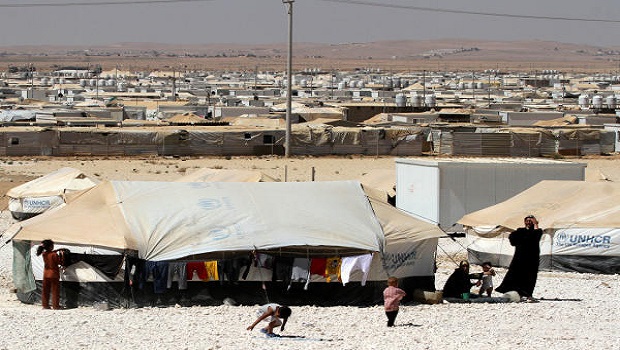
Syrian refugees stand near their tent at Zaatari camp near the Syrian border, near Mafraq, Jordan, on Friday, July 26, 2013. (AP Photo/Raad Adayleh)
The agreement was signed by Minister of Planning and International Cooperation Ibrahim Sayf on behalf of the Jordanian government and by World Bank director for the Middle East and North Africa, Farid Belhaj.
Sayf stressed the importance of the World Bank in helping Jordan cope with this crisis, as well as other issues. He said Jordan viewed the World Bank as a strategic partner in advancing economic development and achieving Jordan’s national interests. He added that this loan was part of the World Bank efforts to help Jordan deal with economic challenges and pressures that resulted from current regional issues, especially the situation in Syria.
He highlighted the direct and indirect impact of the ongoing problem of receiving Syrian refugees, and providing them with services and humanitarian needs, resulting in a heavy burden on the budget, as well as water, education, health and energy sectors.
Jordan is estimated to be currently home to just over half a million Syrian refugees, compared to a native Jordanian population of 6.5 million.
Belhaj expressed appreciation for the progress made in the implementation of various reform plans in Jordan. He said the World Bank also appreciated Jordan’s efforts in hosting Syrians and the implementation of an open-door policy, but also appreciated the financial difficulties Jordan was going through.
Belhaj emphasized the World Bank’s commitment to provide Jordan with technical and financial aid programs in all fields to enable it to achieve growth and sustainable development, and contribute to strengthening relations between the two parties.
The loan will fund two sectors: health, and government subsidies. In the health sector, the program will fund medicines and vaccinations, and will fund treatment for Jordanians outside the Ministry of Health facilities.
This is related to Jordanians transferred from Ministry of Health facilities to the private sector due to the inability of these facilities to absorb Jordanians because they are overcrowded with Syrians.
The government subsidies program will be aimed at two products. Part of the aid will go to bread, the rest to gas for domestic heating and cooking.
This loan will be a long-term loan with a long period of repayment and a low rate of interest, which is relatively less than those offered by other financial institutions. The loan will be handled by the Ministry of Finance, where 40 percent of the loan will be spent with retrospective effect, to cover expenses caused by the reception of Syrian refugees in Jordan.
